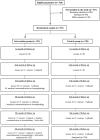Online participatory intervention to promote and support exclusive breastfeeding: Randomized clinical trial
- PMID: 30825414
- PMCID: PMC7198959
- DOI: 10.1111/mcn.12806
Online participatory intervention to promote and support exclusive breastfeeding: Randomized clinical trial
Abstract
The support offered to mothers after hospital discharge can be decisive in maintaining exclusive breastfeeding during the first 6 months post-partum. The objective of this study was to assess the impact on the duration of exclusive breastfeeding of a participatory intervention using an online social network. A randomized clinical trial was performed involving 251 mother-child pairings in a university hospital in the Northeast of Brazil, 123 of which assigned to the intervention group and 128 to the control group. After hospital discharge, the intervention group was followed through a closed group of an online social network, where weekly posters were published on topics related to breastfeeding and an active communication was established with the mothers. The groups were interviewed monthly over the phone until the child reached 6 months of age. The duration of exclusive breastfeeding was calculated through survival analysis, and the effect of the intervention was estimated through the Cox regression model. The exclusive breastfeeding frequencies were higher in the intervention group in all follow-up months, reaching 33.3% in the sixth month versus 8.3% in the control group. The median exclusive breastfeeding duration was 149 days (95% CI [129.6, 168.4]) in the intervention group and 86 days (95% CI [64.9, 107.1]) in the control group (P < 0.0001). The proportional risk of early interruption of exclusive breastfeeding was 0.38 (95% CI [0.28, 0.51], P < 0.0001). This intervention had a positive impact on the duration and frequency of exclusive breastfeeding.
Keywords: breastfeeding; clinical trial; health education; puerperium; social media; social support.
© 2019 John Wiley & Sons Ltd.
Conflict of interest statement
The authors declare that they have no conflicts of interest.
Figures
References
-
- Ahmed, A. H. , Roumani, A. M. , Szucs, K. , Zhang, L. , & King, D. (2016). The effect of interactive web‐based monitoring on breastfeeding exclusivity, intensity, and duration in healthy term infants after hospital discharge. Journal of Obstetric, Gynecologic, and Neonatal Nursing, 45(2), 143–154. 10.1016/j.jogn.2015.12.001 - DOI - PMC - PubMed
-
- Aksu, H. , Küçük, M. , & Düzgün, G. (2011). The effect of postnatal breastfeeding education/support offered at home 3 days after delivery on breastfeeding duration and knowledge: A randomized trial. The Journal of Maternal‐Fetal & Neonatal Medicine, 24(2), 354–361. 10.3109/14767058.2010.497569 - DOI - PubMed
-
- Alves, T. , de Carvalho, J. B. L. , Cavalcante, R. D. , Teixeira, G. A. , da Silva, F. C. B. , de Oliveira, A. M. , & dos S. Silva, G. W. (2017). Influences of non‐accession to exclusive breastfeeding: Understanding of feminine subjectivity. International Archives of Medicine, 10, 1–9.



